 EN
EN
 PT
PT
Look carefully and try to be the quickest of them all

Product: Teaching tools
ISBN: 9788859011835
Publication date: 01/01/2017
REQUEST A SAMPLE OR MORE INFORMATION
 Rights sold to:
Taiwan - Complex Chinese, Russia
Rights sold to:
Taiwan - Complex Chinese, Russia
Pay attention and concentrate.
You must be a keen observer.
Turn over your cards and after making a quick calculation decide what move you’re going to make, always trying to be faster and better than your opponent. Will you be the one to bring home the most booty? Pay attention to the challenges and never drop your guard, it’s a game for clever, crafty crooks.
Objectives: attention, self-control, calculation abilities and reaction speed.
Contents of box: 60 “Action” cards, 60 “Number” cards, 30 gold nuggets, game instructions
Age: 5-99
Players: 2-6
Quick Fingers is part of the Playing to grow series, a new line of board games, conceived by Gianluca Daffi, which combine the pleasure of playing together with the opportunity to develop one or more specific executive functions: emotional self-regulation, response inhibition, working memory, focused attention, planning and flexibility.
60 «Action» cards
60 «Number» cards
30 gold nuggets
game instructions

Pay attention and concentrate. You must be a keen observer. Turn over your cards and after making a quick calculation decide what move you're going to make, always trying to be faster and better than your opponent. Will you be the one to bring home the most booty?
QUICK FINGERS is a game in the «Playing to grow» series, conceived by Gianluca Daffi, a university lecturer and expert in childhood and adolescent psychology.
Each game focuses on a specific executive function or cognitive process with the aim of developing it whilst having fun.
QUICK FINGERS specifically develops attention, self-control, calculation abilities and reaction speed.
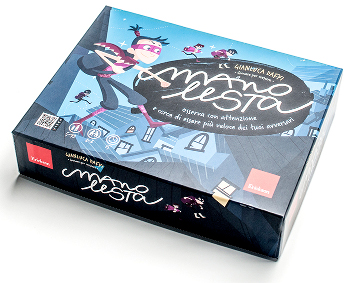
HOW TO PLAY
Preparation Deal out the cards so that each player has the same number of «Action» cards and «Number» cards and divide the gold nuggets evenly between the players.

Each player puts the 2 decks in front of them on the table, as shown.
Start of the game
On saying go each player turns a card from both decks over at the same time, thus they will have an «Action» card and a «Number» card in front of them. At this point they'll have to quickly decide what action to do and how many times.
What's the action? Look at the «Action» cards
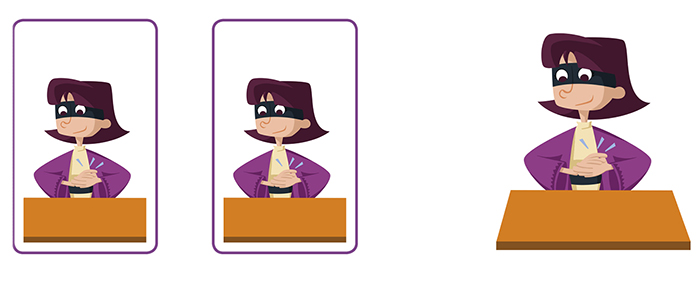
If the two players' cards have the same action, they have to do the action shown on the cards: clap their hands in front.
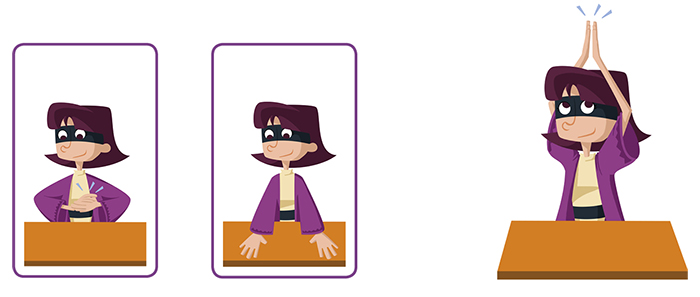
If the two players' cards have different actions, they have to do the action not shown on the cards: clap their hands above their head.
How many times? Look at the «Number» cards
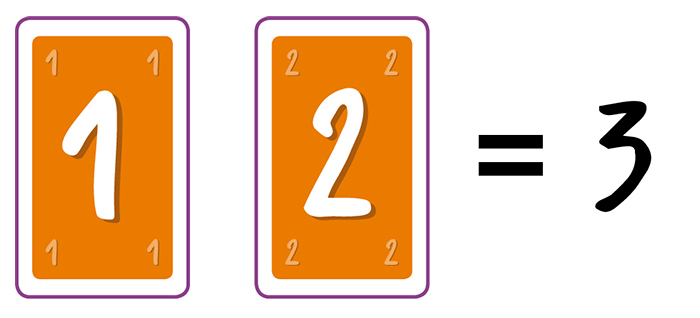
If the two players' cards are the same colour, they have to add up the numbers on the two cards.
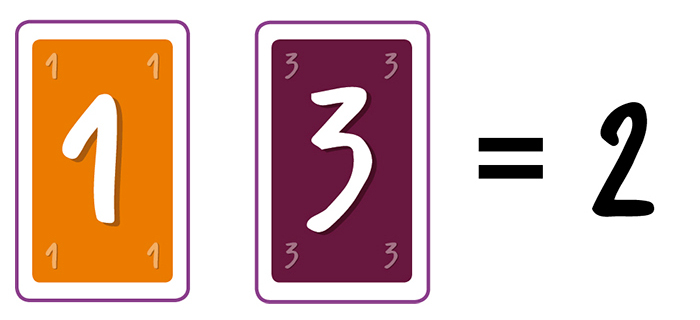
If the two players' cards are different colours, they have to subtract the smaller number from the larger one. In the event that the answer is zero, they have to shout «Quick Fingers» and not perform the actions.
The player who does the right action the right number of times first (or, in the event of zero, shouts «Quick Fingers» first) wins a gold nugget from their opponent. If both players make a mistake the game continues with new cards turned over; used cards should be put towards the edge of the table.
End of the game
The winner is the player who manages to take all their opponent's gold nuggets or - if the cards finish - has the most gold nuggets.
A GAME WHICH STIMULATES EXECUTIVE FUNCTIONS

What are executive functions?
Executive functions are the set of mental processes which monitor our thoughts and behaviours. They incorporate various neurological operations which are needed to control and coordinate our actions. Put more plainly they are like a series of little gnomes who all work together in our brain, helping us execute any kind of task we might face in our daily lives.
FLEXIBILITY – In other words the ability to adapt to new situations and handle contingencies appropriately PLANNING – In other words the ability to see yourself reaching an objective and understanding the steps to be taken to achieve it FOCUSED ATTENTION – in other words the ability to concentrate on certain elements, selecting what is useful by "filtering" it from all the other information available WORKING MEMORY – In other words the ability to remember information connected to the execution of an activity and the time needed to conclude said activity RESPONSE INHIBITION – In other words the ability not to implement the first response we impulsively tend to produce, whether it is opportune or not EMOTIONAL SELF-REGULATION – In other words the ability to handle your emotions and keep your feelings under control so they do not prevent you from reaching your goals